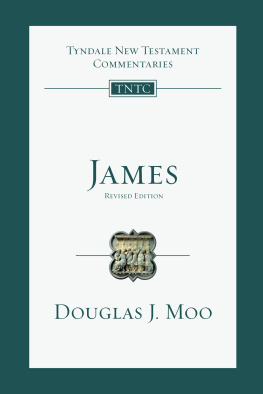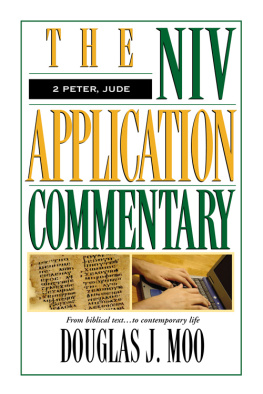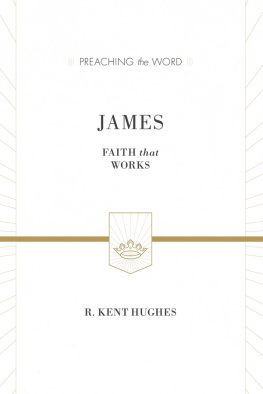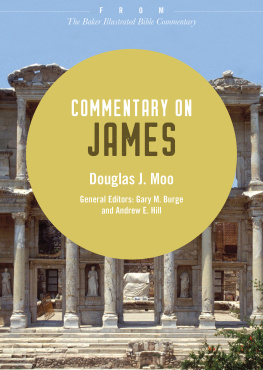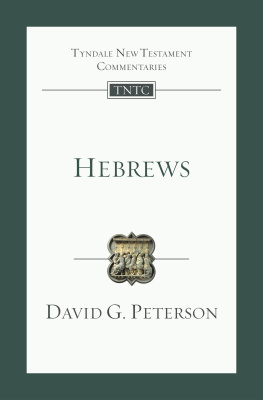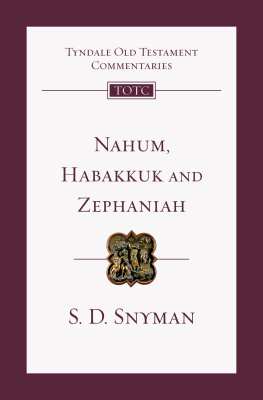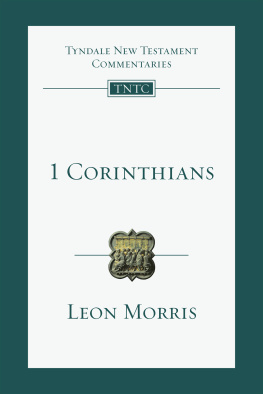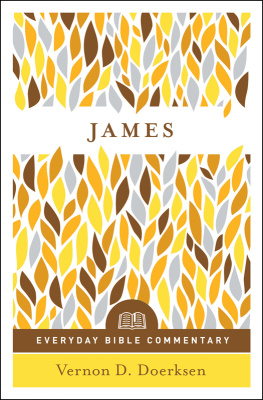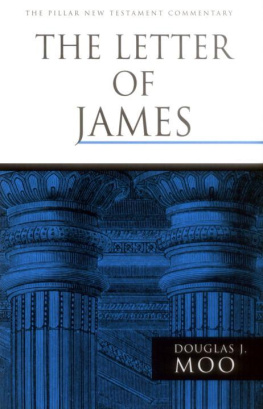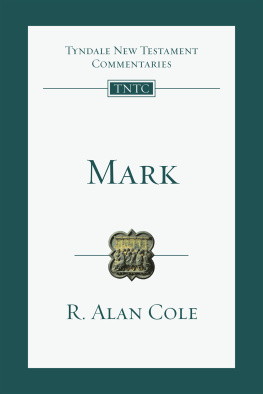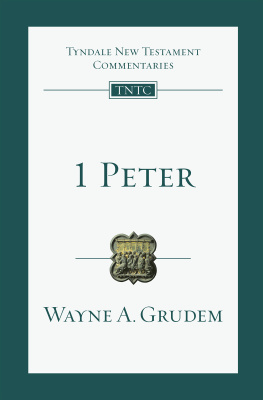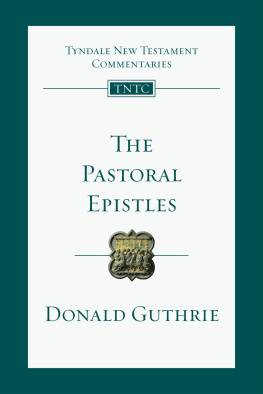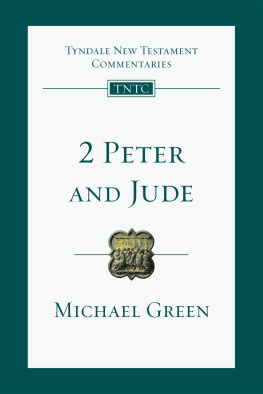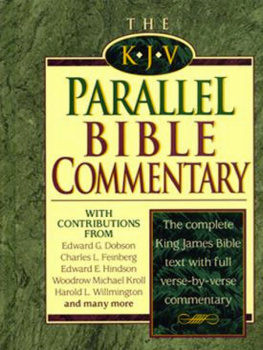TYNDALE NEW TESTAMENT
COMMENTARIES
VOLUME 16
JAMES
TYNDALE NEW TESTAMENT
COMMENTARIES
VOLUME 16
SERIES EDITOR: ECKHARD J. SCHNABEL
CONSULTING EDITOR: NICHOLAS PERRIN
JAMES
AN INTRODUCTION AND COMMENTARY
DOUGLAS J. MOO
InterVarsity Press, USA
P.O. Box 1400
Downers Grove, IL 60515-1426, USA
www.ivpress.com
2015 by Douglas J. Moo
Douglas J. Moo has asserted his right under the Copyright, Designs and Patents Act, 1988, to be identified as Author of this work.
All rights reserved. No part of this book may be reproduced in any form without written permission from InterVarsity Press.
InterVarsity Press, USA, is the book-publishing division of InterVarsity Christian Fellowship/ USA and a member movement of the International Fellowship of Evangelical Students. Website: intervarsity.org.
Unless otherwise indicated Scripture quotations are from the Holy Bible, New International Version, niv Copyright 1979, 1984, 2011 by Biblica, Inc. Used by permission. All rights reserved worldwide.
First edition 1985
Second edition 2015
ISBN 978-0-8308-9827-5 (digital)
ISBN 978-0-8308-4287-2 (print)
This digital document has been produced by Nord Compo.
General preface
The Tyndale Commentaries have been a flagship series for evangelical readers of the Bible for over sixty years. The original New Testament volumes (19561974) as well as the new commentaries (19832003) rightly established themselves as a point of first reference for those who wanted more than is usually offered in a one-volume Bible commentary, without requiring the technical skills in Greek and in Jewish and Greco-Roman studies of the more detailed series, and with the advantage of being shorter than the volumes of intermediate commentary series. The appearance of new popular commentary series demonstrates that there is a continuing demand for commentaries that appeal to Bible study leaders in churches and at universities. The publisher, editors and authors of the Tyndale Commentaries believe that the series continues to meet an important need in the Christian community, not least in what we call today the Global South, with its immense growth of churches and the corresponding need for a thorough understanding of the Bible by Christian believers.
In the light of new knowledge, new critical questions, new revisions of Bible translations, and the need to provide specific guidance on the literary context and the theological emphases of the individual passage, it was time to publish new commentaries in the series. Four authors will revise their commentary that appeared in the second series. The original aim remains. The new commentaries are neither too short nor unduly long. They are exegetical and thus root the interpretation of the text in its historical context. They do not aim to solve all critical questions, but they are written with an awareness of major scholarly debates which may be treated in the Introduction, in Additional Notes or in the commentary itself. While not specifically homiletic in aim, they want to help readers to understand the passage under consideration in such a way that they begin to see points of relevance and application, even though the commentary does not explicitly offer these. The authors base their exegesis on the Greek text, but they write for readers who do not know Greek; Hebrew and Greek terms that are discussed are transliterated. The English translation used for the first series was the Authorized (King James) Version, while the volumes of the second series mostly used the Revised Standard Version; the volumes of the third series use either the New International Version (2011) or the New Revised Standard Version as primary versions, unless otherwise indicated by the author.
An immense debt of gratitude for the first and second series of the Tyndale Commentaries was owed to R. V. G. Tasker and L. Morris, who each wrote four of the commentaries themselves. The recruitment of new authors for the third series proved to be effortless, as colleagues responded enthusiastically to be involved in this project, a testimony both to the larger number of New Testament scholars capable and willing to write commentaries, to the wider ethnic identity of contributors, and to the role that the Tyndale Commentaries have played in the church worldwide. It continues to be the hope of all those concerned with this series that God will graciously use the new commentaries to help readers understand as fully and clearly as possible the meaning of the New Testament.
Eckhard J. Schnabel, Series Editor
Nicholas Perrin, Consulting Editor
Authors preface to the first edition
My first sermon, delivered to a long-suffering professor and four fellow novice preachers, was on James 1:2225. I thought that James emphasis on the need to do the word was important in a seminary context, where all too easily the Scripture becomes a book to be analysed rather than a message to be obeyed. That the message was needed then is certain; that it is still urgently required is equally certain and not only in seminaries. All across the world, people are awakening to biblical Christianity. Third World churches are burgeoning, American evangelicalism continues to attract much attention, and European Christians are seeing renewal and a new evangelistic concern. Yet the personal and social transformations that should accompany such revival are, very often, sadly lacking. Why is this? Surely one of the main reasons is that the simple plea of James do the word is not being heeded. The Bible is being translated, commented on, read, studied, preached and analysed as never before. But it is questionable whether it is being obeyed to a comparable degree.
All this suggests that the message of James is one that we all need to hear and obey. No profound theologian, James genius lies in his profound moral earnestness; in his powerfully simple call for repentance, for action, for a consistent Christian lifestyle. His words need to thrust through our theological debates, our personal pre-conceptions, our spiritual malaise, and set us back on the road to a biblical, invigorating, transforming Christianity.
I owe thanks to many people who helped in making this commentary possible. Dr Leon Morris has been an encouraging yet eagle-eyed editor. Trinity Evangelical Divinity School, where I teach, has graciously provided secretarial time and Luann Kuehl has had the perplexing (and sometimes amusing) job of deciphering my hand-writing. Students here at Trinity and in several churches have, with their papers, questions and comments, greatly influenced my understanding of the letter. My five children have been a source of diversion (not always wanted!), personal renewal and joy. Most of all, my wife Jenny has both encouraged me in the work and, by commenting on the whole manuscript carefully, immeasurably improved both its style and its content. It is to her I dedicate the book.
Douglas J. Moo
Preface to the second edition
I am grateful for the opportunity to return, after almost thirty years, to the first book I wrote and to bring it up to date for a new generation of believers. Differences from the older edition consist in the addition of some of the important books and articles on James published since 1985, improvement in style, and a few tweaks in my interpretive conclusions. I appreciate the editing assistance of my colleague Nick Perrin and former colleague Eckhard Schnabel. And two of my PhD students at Wheaton, Mike Kibbe and Ben Dally, have provided very valuable bibliographic and editing assistance.

